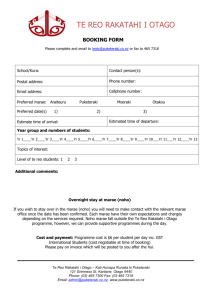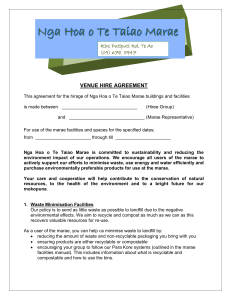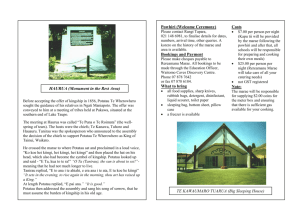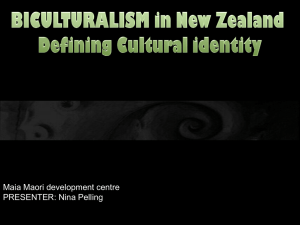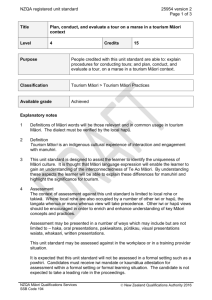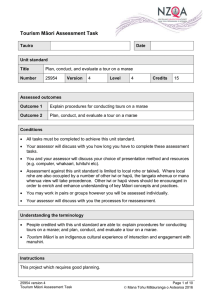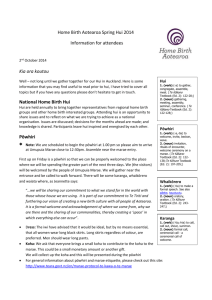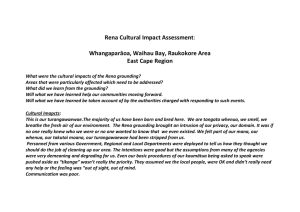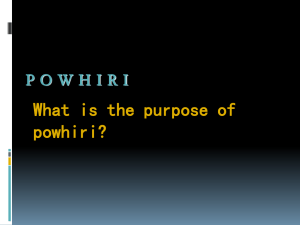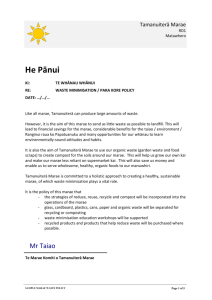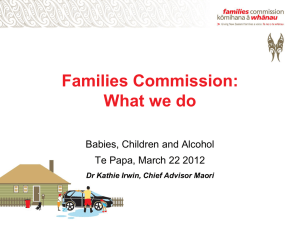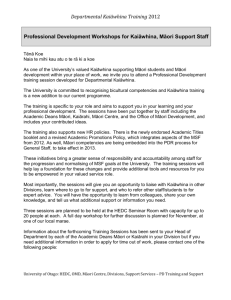Here
advertisement
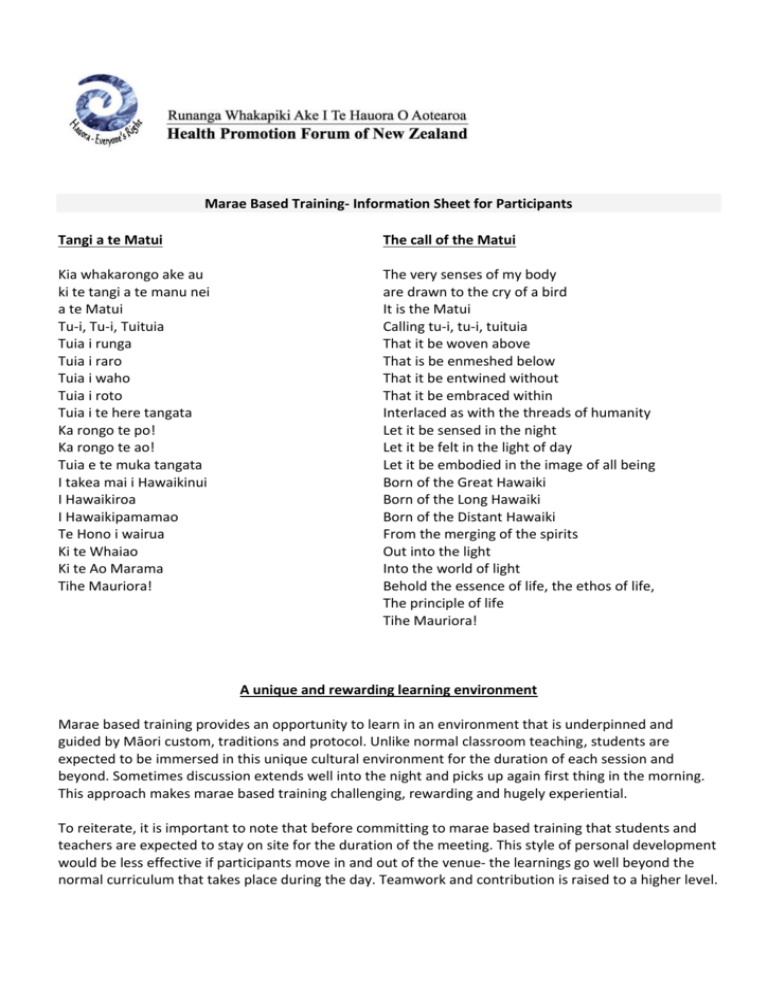
Marae Based Training- Information Sheet for Participants Tangi a te Matui The call of the Matui Kia whakarongo ake au ki te tangi a te manu nei a te Matui Tu-i, Tu-i, Tuituia Tuia i runga Tuia i raro Tuia i waho Tuia i roto Tuia i te here tangata Ka rongo te po! Ka rongo te ao! Tuia e te muka tangata I takea mai i Hawaikinui I Hawaikiroa I Hawaikipamamao Te Hono i wairua Ki te Whaiao Ki te Ao Marama Tihe Mauriora! The very senses of my body are drawn to the cry of a bird It is the Matui Calling tu-i, tu-i, tuituia That it be woven above That is be enmeshed below That it be entwined without That it be embraced within Interlaced as with the threads of humanity Let it be sensed in the night Let it be felt in the light of day Let it be embodied in the image of all being Born of the Great Hawaiki Born of the Long Hawaiki Born of the Distant Hawaiki From the merging of the spirits Out into the light Into the world of light Behold the essence of life, the ethos of life, The principle of life Tihe Mauriora! A unique and rewarding learning environment Marae based training provides an opportunity to learn in an environment that is underpinned and guided by Māori custom, traditions and protocol. Unlike normal classroom teaching, students are expected to be immersed in this unique cultural environment for the duration of each session and beyond. Sometimes discussion extends well into the night and picks up again first thing in the morning. This approach makes marae based training challenging, rewarding and hugely experiential. To reiterate, it is important to note that before committing to marae based training that students and teachers are expected to stay on site for the duration of the meeting. This style of personal development would be less effective if participants move in and out of the venue- the learnings go well beyond the normal curriculum that takes place during the day. Teamwork and contribution is raised to a higher level. Marae are not simply venues where people meet and eat. For Māori, marae are central and iconic to Māori philosophy, beliefs and world views. Marae are our universities, our museums, our art galleries, our maternity wings, our churches, our classrooms, our pre-schools, our genealogical archives, our playgrounds, our funeral parlours and much more. Marae are safe, nurturant and sheltered environments. They are in essence a centralised repository of all things Māori and because of this should be treated with upmost respect and care. Whether very experienced or not at all, this information is provided to students and participants as a general guide to help prepare for the marae based training environment. From marae to marae there are slight variations in terms of kawa (protocols and custom) and these will be explained to participants before the process begins. For the purposes of preparation beforehand the following information may be useful to you. Note: Prepare to be stretched! What to bring Sleeping bag or duvet, easily removable shoes, name-tags, warm socks, writing pads, pen, good book (or laptop), towel/s, toiletries, warm clothes, playing cards, musical instruments. Please leave radios and portable stereos at home. If you are bringing a laptop please try to manage the potential for distraction to others e.g. keyboard “tapping” levels and bright screens after lights out. Good manners for entering and staying on the marae Here are some notes on good manners and protocol during your stay on the marae. As mentioned this is only a guide to explain the tikanga/ custom of the tangata whenua/ local people who are our hosts. We take our lead from them. We the visitors are called manuhiri. The powhiri/ welcome The following is a commonly used process for the powhiri which should provide a useful guide for participants. Depending on location and tribal affiliation there will be small variations. These will be explained by your group leader or tutor beforehand. Assemble outside the Marae and wait for the powhiri to commence. Park cars outside and leave your baggage in your vehicle until such time as you are advised to bring them in, usually sometime after the powhiri has finished. A guide will communicate procedure before the powhiri begins. When all are ready, assemble on the edge of the marae area or just outside the waharoa/ entrance/ gateway. By this time speakers for the group would have been appointed- usually up to 3 speakers. The powhiri will commence when we hear the karanga/ call from the tangata whenua our hosts. Form a group and walk slowly towards the meeting house. Depending on who is leading the group and local kawa/ protocols there may be one or more pauses as you near the wharenui/ meeting house. At some point after this you may be ushered either to a seating area just outside the wharenui or into the wharenui itself. If you are directed into the wharenui remove all footwear before entering (maintain this approach for the duration of the stay). Hosts will usually start proceedings with a karakia/ prayer immediately followed by their speakers. Again depending on location and kawa, speakers may either: 1. alternate between hosts and visitors concluded by the final speaker from the host side- this is called Tauutuutu or 2. the host speakers will all speak in order followed by the visitors- this is called Pāeke The hosts will almost always have the final speaker to close this part of the ceremony. In accordance with custom waiata are usually sung after each speaker. At the conclusion of the formal speeches we, the visitors, will then shake hands and hongi/ press noses with the hosts. With the formalities of welcome concluded more informal details about procedure will be provided to the group. Our programme for the day then proceeds. Note: If you cannot avoid arriving late please come onto the marae leaving your baggage outside the entrance until you have been formally welcomed. Go to the kitchen/ dining room, introduce yourselves to the tangata whenua/ hosts and they will bring you over to the wharenui where you can join the group. If in doubt always ask. Karakia A karakia will be said before all meals. Please do not commence eating until this has occurred. Again if you are unsure always ask. As customary, at the beginning and end of each day a karakia will be said or recited and occasionally karakia will also be used in the body of the programme. During the hui Tidy mattresses and bedclothes neatly before breakfast. The head is considered very tapu/ sacred to Māori, so do not sit on pillows. Do not eat or smoke in the meeting house. Never walk over people or across the line of speakers. Crouch and go behind at all times. Be unobtrusive. Dress is informal, simple and neat at all times. Do not sit or lean on dining room (or any) tables. Bottoms and food don’t mix. Baggage is brought in when formalities are over, not before. Keep clothes in suitcases or neatly folded on top. Do not hang any clothing or belongings from the walls. Always remove footwear before entering the wharenui. Before retiring bring your shoes inside. Store in a plastic bag and put with your other belongings. Once you are part of the group and have been welcomed on, you become one of the tangata whenua/ hosts. You should be prepared to help with the chores both inside and out. Don’t be afraid to offer your help. There is always something to do. As tangata whenua we take great pride in keeping all areas, both inside and out of the marae clean and tidy. At some point during your stay it is likely that the tangata whenua will join you to talk about local history and share stories that are from their area. They may also talk about the wharenui, wharekai and other aspects. This is very much an extension of your learning and we encourage full participation in these discussions. Marae based learning should be an enjoyable, safe and rewarding experience. In order for this to occur it is important that you find out all you can beforehand and ask questions throughout the stay. Those with the answers will be more than happy to share their knowledge. There are many other details but this information should provide a useful starting point. Kaumatua and Kuia/ Tribal Elders Finally, it is likely that you will meet the local kaumatua/ elders, the entrusted repositories of sacred lore, genealogy and history for the tangata whenua. These people are very much loved, valued and cared for. Whenever possible take time to make time with them, attend to their need for comfort and assist them whenever necessary. Above all look, learn and listen- the time spent could be an opportunity for a lifelong and perhaps life-changing experience. Summed up perhaps in the following Māori maxim: Ka Rangatira te tangata mehemea e tana kuia ia e manaaki. Pēnā ākina nei e ngā hau ko tana kuia hei whakaruruhau mōna. A Māori welcomed home and nurtured by his beloved kuia is rich indeed. When the whole world is against you, your kuia will always be your friend. Nga mihimihi ki a koutou katoa. Best wishes to you all.
